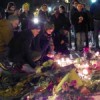The sexual assault on foreign correspondent Lara Logan in Cairo last week underscores the dangers facing many women who report from the world’s hotspots.
Veteran conflict reporter Judith Matloff discusses the issue at length in a 2007 article in the Columbia Journalism Review. (pdf)
“Female reporters are targets in lawless places where guns are common and punishment rare,” writes Matloff, who experienced a close call herself on assignment in Angola.
“War zones in particular seem to invite unwanted advances, and sometimes the creeps can be the drivers, guards, and even the sources that one depends on to do the job.”
Most troubling, says Matloff, is the number of incidents that go unreported. Fearing the loss of a beat or a job, many reporters keep quiet about sexual abuse.
“The compulsion to be part of the macho club is so fierce that women often don’t tell their bosses. Groping hands and lewd come-ons are stoically accepted as part of the job, especially in places where western women are viewed as promiscuous.”
Along with horror and disgust, news of the attack on Logan also brought about questions that I hope to find answers to in the coming days.
Firstly, what sort of security unit did CBS provide Logan with? I would imagine that in such a politically charged situation involving large crowds, CBS would outfit its reporters with an effective security detail. What is the safety protocol when sending a correspondent into a potentially explosive situation? If she wasn’t provided with necessary protection, why not?
Who were her attackers, and have any of them been detained by the soldiers who intervened? Along with an estimated 20 Egyptian soldiers, a brave group of women also came to Logan’s aid. Certainly, someone could identify at least one of the perpetrators.
Finally, was the attack (like so many) a crime of opportunity carried out by thugs, or was Logan targeted because she was a journalist?
The Egypt protests have proven particularly tough for journalists, who have been threatened, roughed up and detained by pro-Mubarak forces. During the 18-day revolution, the Committee to Protect Journalists documented 140 attacks on the press. Logan herself was detained last week.
“We were heavily, heavily intimidated and bullied,” she told Charlie Rose. “Repeatedly followed, accused of being agents and spies for Israel. We didn’t even have our cameras with us at that point.”
Whatever the reason behind the assault, I applaud Logan’s decision to make it public. Logan is a high-profile journalist, and I hope her ordeal sends a wake-up call to news agencies and fellow journalists everywhere.
As Matloff puts it, “Women have risen to the top of war and foreign reportage. They run bureaus in dodgy places and do jobs that are just as dangerous as those that men do. But there is one area where they differ from the boys–sexual harassment and rape.”
To lessen the incidents of sexual assaults, media agencies must provide female correspondents with both the necessary sexual abuse awareness training before heading into the field, and with adequate security once on the ground.
But it is also up to female reporters to come forward about the threat of sexual abuse on the job. That we face additional vulnerabilities in the field is a sad reality, but it doesn’t diminish our ability as reporters and storytellers. Keeping silent does a disservice to women and to the profession.
Bravo to Logan for having the courage to turn a spotlight on this issue in spite of her personal tragedy.





1 Comment
Thanks for posting on this. I agree that more needs to be done, and more attention needs to be put on these types of crimes. What happened to Lara Logan shouldn’t happen to anyone. Journalists have a tough enough time doing their jobs as it is.